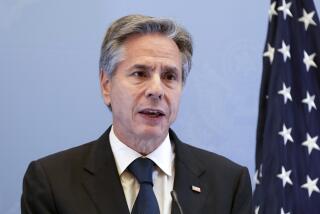Budgetary spat in Iran
Iran watchers sought to make sense Monday of a spat between the conservative speaker of parliament and the country’s hard-line president over a budgetary issue that found supreme leader Ali Khamenei issuing a rare but opaque opinion.
The incident was the latest sign of discord within the Islamic Republic’s byzantine ruling system, which combines elements of a democratically elected republic with a theocracy headed by Shiite Muslim clerics, with Khamenei superior to both.
FOR THE RECORD:
Iranian budget: An article in Tuesday’s Section A about a budget dispute among leaders of Iran described the Guardian Council as a committee of clerics. It consists of both clerics and jurists. —
Parliament Speaker Gholam Ali Haddad Adel on Monday read aloud from the text of the supreme leader’s opinion, which the lawmaker said backed up his position in a dispute with President Mahmoud Ahmadinejad. The president had refused to implement a plan to divert $1 billion to buy more natural gas to remedy heating-supply shortages.
“The implementation of all bills that follow constitutional channels is mandatory for all branches of the state,” the statement read.
Some analysts and news reports described the statement as a slap at Ahmadinejad and his camp by Khamenei ahead of March 14 parliamentary elections.
Others sharply disagreed.
“It’s a dispute within the government because Ahmadinejad’s been unable to deliver” on the economy, said Bijan Bidabad, an economist. “This has nothing to do with the supreme leader.”
A rift has emerged among conservatives, who worry about how they will fare in the upcoming vote in light of Ahmadinejad’s poor economic performance, said another analyst.
“It shows that among the hard-liners the gap is widening,” said Saeed Allah-Bedashti, a politician close to the camp of liberal-minded former President Mohammad Khatami. “But the gap is between Haddad Adel and Ahmadinejad, not between the supreme leader and Ahmadinejad.”
Iran is the world’s fourth largest oil exporter, but it suffers from chronic unemployment estimated at up to 20% and an official inflation rate of 19%.
Monday’s budgetary quarrel came amid an extraordinary cold snap across the Middle East that has depleted natural gas supplies and caused heating-supply shortages throughout Iran, especially in rural hamlets, which are the conservatives’ base of support.
Iranian lawmakers voted to divert money for natural gas. Ahmadinejad, apparently worried that pouring more cash into the economy would increase inflation, called parliament’s decision unconstitutional.
Haddad Adel turned to Khamenei, who issued the opinion that all government branches must follow the constitution. Under Iran’s legal system, laws are vetted by a committee of clerics called the Guardian Council, not the president. Disputes between parliament and the presidency must be mediated by the Expediency Council, which is led by Ayatollah Hashemi Rafsanjani -- a powerful cleric and politician who leads a faction opposed to Ahmadinejad.
Some saw Khamenei’s intervention as a rare public rebuke against Ahmadinejad, who has largely tried to disregard the parliament since he took office in 2005, sometimes implementing rules and dissolving agencies without seeking lawmakers’ approval.
Others read the supreme leader’s statement as simply an attempt to restore some semblance of balance between a weakened parliament increasingly worried by the government’s lack of progress on the economy and a president who tries to rule by fiat, at least on the economy.
Though Khamenei has by and large stood by the president publicly, he is now under enormous pressure from factions within Iran’s ruling circle to rein him in, analysts in Tehran said.
The incident was also seen as parliament standing up for its rights -- albeit cautiously.
“In the past three years, [Haddad Adel] saw the mismanagement and did nothing about it,” said Emad Afroogh, a member of parliament critical of Ahmadinejad.
“Even here, instead of delivering on his own constitutional responsibilities, he utilizes the supreme leader.”
Special correspondent Mostaghim reported from Tehran and Times staff writer Daragahi from Beirut.
More to Read
Start your day right
Sign up for Essential California for news, features and recommendations from the L.A. Times and beyond in your inbox six days a week.
You may occasionally receive promotional content from the Los Angeles Times.






